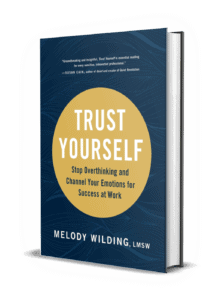Have you have felt insecure about your leadership ability? Or maybe you have struggled with imposter syndrome throughout your career. Whatever the case, the common factor undermining your confidence is an overactive inner critic.
Meet Michael. Michael woke up every morning with a pain in his stomach.
The thought of going to work made him tense. This wasn’t because he didn’t like his job – it was because he felt like he wasn’t any good at it.
You see, six weeks earlier, Michael had started a new role as Director of Engineering at a large Fortune 500 healthcare company. Instead of feeling like this was an achievement to celebrate, he felt immense pressure. He was hired to turnaround a failing team and senior leadership had big plans to scale his initiatives if he could prove that he’d be successful.
Now a little over one month into his new role, Michael couldn’t shake his imposter syndrome. He imagined that senior leadership was getting impatient with the lack of progress and felt easily hurt by collaborators who would swoop in to criticize his team’s efforts. Taking situations personally derailed his confidence, mood, and motivation for hours – sometimes days.
A naturally reserved and sensitive person, Michael had a bad habit of falling into questioning himself and his worth when this happened, which is how he found himself waking up every night in a cold sweat, worried about his ability to rise to the challenge and perform on the job.
Despite the fact that he had multiple degrees and was obviously intelligent, Michael still found himself looking over his shoulder almost every day, waiting for the moment when his boss would tell him to pack up his stuff and leave because they had found out he wasn’t qualified or equipped to do the role.
Can you relate to any part of Michael’s story?
If so, you well know the harsh, critical inner voice that says things like:
- Why would anyone listen to you?
- You better work harder so you don’t fail.
- What an idiot you are!
…And on and on.
As an executive coach to Sensitive Strivers (sensitive high-achievers), I see smart, big-hearted leaders constantly get in their own way because they don’t know how to properly manage their own psychology.
Changing your relationship with your inner critic is a long-term process. It won’t happen overnight, but that doesn’t mean you shouldn’t start making changes today. The sooner, you take steps to free yourself from your inner critic, the sooner you’ll experience the confidence, inner peace, and success you deserve.
8 Tips to Get Your Negative Self-talk Under Control Today:
1. Give it a Name
Personify your inner critic. Give it an identity that’s outside of you so you can gain distance from it. One of my client’s called his inner critic Darth Vader. He went as far as to buy a Darth Vader Lego figure and place it on his desk. Every time his inner critic started causing a fuss, he’d look at it and say “not today, Darth,” which helped stop the negative inner dialogue in its tracks. I’ve had other clients call their inner critic things like “the little monster”. Julia Cameron, the author of The Artist’s Way, calls hers the Accountant. He is a grey-suited bore who is forever telling her to forget all this creativity nonsense and to be more sensible.
Pick something silly and light-hearted so you start regarding your inner critic as something that lacks credibility. Doing so helps put your negative self-talk into perspective and takes away some of its power. You can acknowledge it’s there without necessarily having to buy into what it’s saying or letting it order you around.
2. Play with Your Thoughts
I like to sing my self-critical thoughts to the tune of Belinda Carlisle’s hit song “Heaven is a Place on Earth” or Hanson’s “MMMbop.”
You can also bring humor and lightness to your thoughts by simply changing the typeface. In your mind’s eye, picture making the font on your negative thought teeny tiny comic sans, for example. You’ll find it’s much easier to approach your thinking with a lighter mindset, instead of buying into your negative inner dialogue as indisputable truth.
3. Remind Yourself with a Rubber Band
Keep a rubber band or hair tie on your wrist. Each time you notice that your inner critic is taking over, snap the band and silently say “STOP.” This brings you back to the present moment where you can have more command and control over choosing your thoughts.
4. End with an “And”
There’s a popular improv comedy tool you can steal for managing your mindset: “yes, and…” In improv, instead of replying “no” to someone, you reply “yes, and…”, which means that you’re listening to your partner’s ideas, agree with the premise, and then contribute additional thoughts.
Here’s how to apply it to your self-talk: Let’s say your inner critic is telling you something like, “I never do anything right.” Instead of trying to fight the thought, acknowledge it, because there may be some truth to it. Then, more importantly, focus on what other facts might also be true. For example, “Yes, I may have made a mistake, and I can learn from it to make changes next time.”
5. Draft Power Statements
A power statement is a reminder that helps bring you back to your center. For example, “you can handle this” or “ a person’s reaction is a reflection of them, not me.”
Power statements are not the same as positive affirmations. Positive affirmations are usually based on wishful, Pollyanna, positivity (i.e. I’m wildly successful and confident beyond measure) that is inconsistent with your actual beliefs. Power statements, on the other hand, are grounded and balanced reminders.
Keep your power statements somewhere visible and prominent. For example:
- Post them on sticky notes you place on your computer monitor or mirror
- Make one the background of your phone
- Create them as calendar reminders you send to yourself a couple of times per week
6. Keep a Brag File
I have many of my clients create an ongoing place where they keep track of their accomplishments and progress they’re proud of on a daily or weekly basis. This can be a google doc, a note on your phone, an email folder – whatever works for you.
Not only is your brag file uplifting, but more importantly it helps rewire your brain’s negativity bias and the tendency that comes with IS to focus only on your weaknesses. Plus, come time for performance reviews, your brag file is invaluable.
One of my clients just used her brag file to write her resume and now is using it to interview for jobs. Before she used to struggle with talking about herself but having the brag file made it so much easier to speak to the results she had gotten over the past few years with confidence.
7. Create a Playlist
Music is proven to lift your mood and reduce anxiety, which makes it the perfect antidote to the demoralizing effects of the inner critic. Personally, I keep a playlist of my favorite uplifting songs on Spotify that I can switch on whenever I need a little boost.
8. Give Someone Else a Compliment
Get out of your own head and pay someone else a compliment. Edith Zimmerman writing for The Cut explains it perfectly:
I have a small piece of advice, which is that if you’re ever feeling terrible — in one of those clammy, “what am I doing, what am I doing, everything is bad” spirals — get on the computer and email out a few compliments to people. It can jumpstart you out of your own head and back into the world. For me, it’s been like a lifeline when I’ve felt really down. And I feel the worst when I feel the least useful, so sending someone a compliment out of the blue feels like latching back onto the lowest rung of the utility ladder.
Check out the Ultimate Guide for Sensitive Strivers for free resources to outsmart imposter syndrome, stop second-guessing yourself, and much more.









